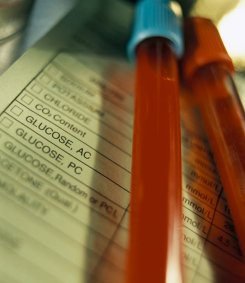 A new study in the Proceedings of the National Academy of Sciences has found that an over-supply of a simple blood sugar could be a major cause of erectile dysfunction in diabetic men. The sugar, present in increased levels in diabetics, interferes with the mechanisms needed to achieve and maintain erection and can lead to permanent penile impairment over time. The results may have implications for treating diabetic erectile dysfunction, which affects 50 to 75 percent of diabetic men and is rarely treated successfully with conventional drugs like Viagra.
A new study in the Proceedings of the National Academy of Sciences has found that an over-supply of a simple blood sugar could be a major cause of erectile dysfunction in diabetic men. The sugar, present in increased levels in diabetics, interferes with the mechanisms needed to achieve and maintain erection and can lead to permanent penile impairment over time. The results may have implications for treating diabetic erectile dysfunction, which affects 50 to 75 percent of diabetic men and is rarely treated successfully with conventional drugs like Viagra.
The researchers, from the Brady Urological Institute at Johns Hopkins, suspected O-GlcNAc, a blood sugar present in hyperglycemic circumstances, to be the culprit.
"We were interested to determine whether high glucose in diabetes mellitus modifies the endothelial nitric oxide synthase (eNOS) enzyme, which is responsible for the achievement and maintenance of erection," says Biljana Musicki, lead investigator of the study.
Erection begins when a sexual stimulus activates an enzyme that causes the short-term release of nitric oxide (NO) at the nerve endings in the penis, Musicki explained. This causes rapid and short-term increases in penile blood flow and short-term relaxation of the penile smooth muscle, initiating an erection. The resulting expansion of penile blood vessels and smooth-muscle relaxation allows more blood to flow into the penis. O-GlcNAc hinders this normal chain of events and prevents the smooth muscle in the penis from relaxing. Without this relaxation, the production of NO is hindered and a normal, sustained erection cannot occur.
The researchers emphasized the important role blood vessel function played. "The mechanism we describe here stresses the critical importance of vascular function in the erectile response. It may suggest new ways of treating erectile dysfunction by targeting specifically this mechanism in penile erection," said Musicki.
Arthur Burnett, head of the research team, said the study related to more than just sexual issues. "This paper gets back to the physiological relevance of hyperglycemia and how it affects erection. We show here - using erection as a model - the vascular damage caused by diabetes and provide insights into vascular disease beyond this dysfunction."

